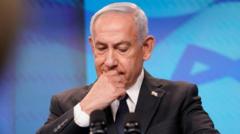Is Israel Experiencing Its Own 'South Africa Moment' in Gaza?

Published: 2025-09-15 18:45:27 | Category: world
The ongoing conflict in Gaza has intensified scrutiny of Israel's global standing, raising questions about its potential shift towards international isolation akin to South Africa's past experience with apartheid. As political, economic, and cultural pressures mount, many wonder if Israel can maintain its diplomatic position or if it faces a reckoning that may alter its trajectory.
Last updated: 12 October 2023 (BST)
Key Takeaways
- Israel's international isolation is deepening amid the Gaza conflict.
- Former Israeli leaders warn that Netanyahu's government is turning Israel into a pariah state.
- Countries like Belgium and Spain are implementing sanctions against Israel.
- Calls for cultural and sporting boycotts are gaining traction, reminiscent of South Africa's apartheid era.
- Despite pressures, Israel retains strong support from the United States.
The Current Landscape of Israel's Diplomatic Relations
The war in Gaza has triggered significant shifts in international perceptions of Israel. Former Israeli Prime Ministers Ehud Barak and Ehud Olmert have voiced concerns that Prime Minister Benjamin Netanyahu's administration is steering Israel towards becoming an international pariah. This sentiment is echoed by a growing number of nations expressing discontent with Israel's military actions in Gaza and the West Bank.
The issuance of an arrest warrant by the International Criminal Court (ICC) has further complicated Netanyahu's ability to travel abroad, limiting his diplomatic engagements. Countries like Britain, France, and Canada have signalled intentions to recognise Palestine as a sovereign state, escalating tensions and concerns regarding Israel's global standing.
International Responses: Sanctions and Boycotts
In recent weeks, a series of sanctions have emerged from European nations in response to Israel's military actions. Belgium has taken a notable step by banning imports from illegal Jewish settlements in the West Bank and restricting consular assistance for Belgians in these areas. Spain has similarly enacted measures, establishing a formal arms embargo and barring entry to individuals associated with war crimes in Gaza.
These actions reflect a broader trend across Europe, where nations are increasingly willing to take a stand against Israeli policies perceived as aggressive. Such measures may serve as a precursor to more widespread sanctions reminiscent of the global actions that pressured South Africa to abandon apartheid.
Historical Context: The South Africa Parallel
The comparison to South Africa's apartheid era is striking. During the 1960s through the 1990s, a combination of political pressure, economic sanctions, and cultural boycotts played a crucial role in dismantling the oppressive regime. Just as South Africa faced isolation, Israel now finds itself in a similar predicament as international opinion shifts against its actions in Gaza.
Key features of the South African sanctions included cultural and sporting boycotts that aimed to delegitimize the apartheid regime. Currently, Israel is facing calls for similar boycotts, with prominent figures in the entertainment industry advocating for a boycott of Israeli productions implicated in human rights violations.
Sporting and Cultural Boycotts: A New Wave of Pressure
Recent developments in the arts and sports highlight the growing discontent with Israel's actions. In the realm of music, several countries have threatened to withdraw from the Eurovision Song Contest if Israel is allowed to participate. This contest, historically significant for Israel, represents more than just a musical event; it is seen as a marker of Israel's acceptance within the international community.
In sports, protests have disrupted events such as the Vuelta de España cycling race, showcasing the public's increasing willingness to confront Israeli participation in international competitions. These actions signal a potential shift in how nations engage with Israel, drawing parallels to the international sporting boycotts that characterised the anti-apartheid movement.
Economic Consequences: Divestment and Trade Sanctions
The economic ramifications of Israel's actions in Gaza are becoming evident. Norway's sovereign wealth fund has begun divesting from Israeli companies, and the EU is considering sanctions against far-right Israeli ministers. This economic pressure could have long-lasting effects on Israel's economy, particularly if other nations follow suit.
Israel's largest trading partner, the EU, is exploring the possibility of suspending trade elements of its association agreement, a move that could significantly impact Israel's economy. The implications of such actions could resonate deeply within Israel, potentially influencing governmental policies and public opinion.
Political Landscape: The Impact on Israeli Leadership
Amidst this diplomatic storm, Prime Minister Netanyahu's government remains defiant. Accusations of antisemitism have been levied against countries implementing sanctions, with Israeli officials framing these actions as unjust attacks on Israel's right to defend itself. However, voices within Israel, including former diplomats, express concern that such a stance may alienate moderate Israelis and hinder peace efforts.
Jeremy Issacharoff, a former ambassador to Germany, noted that Israel's international standing is currently "impaired." He cautioned against the broad brush of sanctions that could inadvertently target all Israelis rather than specific government policies. This sentiment reflects a growing recognition that the actions of the Israeli government could have far-reaching consequences for its citizens and its international relationships.
Future Outlook: Will Israel Face a "South Africa Moment"?
As the situation evolves, many are questioning whether Israel is on the brink of a "South Africa moment." Some argue that while the current pressures are significant, they do not yet equate to the comprehensive isolation faced by South Africa during its apartheid era. Veteran observers suggest that Israel's strong ties with the United States may prevent it from reaching a point of irrevocable isolation.
Despite the growing discontent, countries like Germany, Italy, and Hungary are resistant to more stringent measures against Israel. The lack of unified action within the EU indicates that while pressures are mounting, a cohesive response may be difficult to achieve.
The Path Forward: Navigating Diplomatic Challenges
For Israel, the path forward is fraught with challenges. The government must navigate increasing international scrutiny while addressing domestic concerns about its policies in Gaza. As voices calling for change grow louder, the stakes are high for both Israel's leadership and its citizens.
Former diplomats advocate for a return to constructive dialogue and a commitment to peace, emphasising the need for Israel to reaffirm its place within the global community. The ongoing conflict and the international reactions to it may serve as a catalyst for much-needed changes in policy and approach.
FAQs
What is the "South Africa moment" in relation to Israel?
The "South Africa moment" refers to a potential situation where Israel faces significant international isolation similar to that experienced by South Africa during its apartheid era, driven by political pressure, economic sanctions, and cultural boycotts.
What sanctions have been imposed on Israel recently?
Countries like Belgium and Spain have implemented sanctions against Israel, including bans on imports from illegal settlements and arms embargoes. These actions reflect increasing international dissatisfaction with Israel's military actions in Gaza.
How have cultural and sporting boycotts affected Israel's international standing?
Calls for cultural and sporting boycotts, such as potential withdrawals from the Eurovision Song Contest and protests at sporting events, signal a growing movement against Israel's actions and may impact its international reputation.
What role does the United States play in Israel's diplomatic situation?
The United States remains a staunch ally of Israel, providing strong diplomatic support. This relationship may mitigate some of the pressures Israel currently faces from other nations.
What are the prospects for peace in Israel-Palestine relations?
While there are calls for renewed dialogue and a return to peace talks, the ongoing conflict and international pressures may complicate efforts to achieve lasting peace in the region.
As the situation around Israel continues to evolve, the implications for its international relationships and domestic policies will be significant. Will Israel adapt to the changing landscape or continue down its current path? #Israel #GazaConflict #InternationalRelations


:max_bytes(150000):strip_icc():focal(742x398:744x400)/jamie-nickerson-2-091525-036df6c5f93a4b9a9c1eb27a48063119.jpg)
